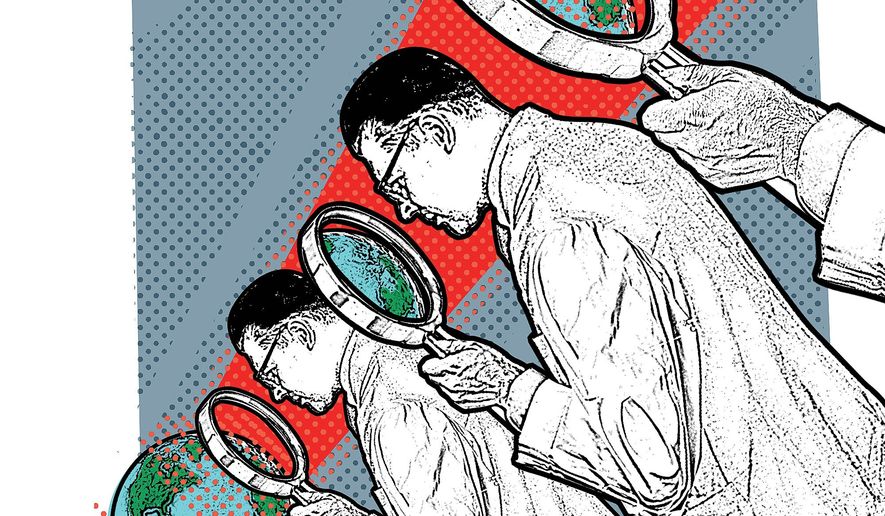OPINION:
The climate of climate science is experiencing a world of change.
For decades, climate science has been rolling along conforming to the mantra that man is manufacturing a planet in peril. Apparently to some, living comfortably in the modern world is sending us into ever-increasing climate catastrophe.
But now the Trump administration, with its rollback of climate rules and review of the Clean Power Plan, is tapping the brakes on the runaway “settled science” of climate change, and the science settlers don’t like it one bit.
So, planning is underway by leftist groups for a march on Washington in April by scientists and science supporters to save the planet from the current ruthless rulers. To that end, pressure is being applied against scientists and scientific organizations to force them out of the lab and into the streets to decry what community organizers see as a war on science by a decidedly political agenda.
Peer pressure from inside and out will be tremendous as many see the Washington protest as vital to saving their jobs and perhaps their careers. After all, academic departments, science and policy institutes, and political funding campaigns have been built on the foundation of “carbon pollution” equals certain planetary death.
Before entering the fray, atmospheric scientists and those who represent the atmospheric science field should ask themselves to what extent has politics influenced past scientific practice. For instance, have politicians simply funded an objective search for truth with respect to human impact on global climate, or have they actually steered the profession toward certain conclusions?
Consider the roots of the issue. Putting aside the fact that focus in the 1970s was on the coming of the next ice age, the global warming frenzy began in earnest in June 1988 when Sen. Timothy Wirth organized congressional hearings on climate change. The event was purposefully staged on one of the hottest days of the year. The sweltering night before the hearings, Mr. Wirth and his staff left the windows of the hearing room open all night to ensure an uncomfortable meeting the next day.
The year 1988 also saw the establishment of the United Nation’s Intergovernmental Panel on Climate Change. The IPCC’s stated role is to assess the “risk of human-induced climate change, its potential impacts and options for adaptation and mitigation ” Typically, scientific investigation is not directed to find a preordained conclusion. There is a tendency rather to heed what Upton Sinclair cautioned, “It is difficult to get a man to understand something when his salary depends upon his not understanding it.”
So, if politics has already clouded climate science, is dissipating the political fog practically necessary?
Make no mistake, past scientific research has already confirmed that the earth’s climate does demonstrably change with human activity. But, the important questions include: To what extent and with what result?
The answer to “to what extent” involves spatial and temporal influences, while “with what result” involves the severity of anthropogenic influence.
For example, we know that humans produce a climate impact called the “urban heat island.” This heat island effect is demonstrated by the several degree increase in city temperatures in comparison with surrounding countryside temperatures. Yet, the heat island effect is on a limited space and time scale that most people seem to find quite bearable and preferable to more rustic subsistence.
Globally, measuring and finding natural versus human culprits for changing climate conditions is quite a bit more problematic. This can be seen in the poor forecasting ability of climate models to get even the rough trend of average global temperature change correct for the past most recent decades.
Besides, much has been made about negative climate effects, such as the small increase in sea level over the years. This modest increase does not necessarily portend permanent flooding or vast migrations. And, warmer climates tend to produce more favorable circumstances for both humans and the ecosystem overall. The tendency to focus only on bad conditions resulting from vaunted modeled increases in global temperatures does a disservice to the breadth of science.
Our understanding of the complex climate system will not be improved with more clamoring for conformance with the settled consensus view. Rather, as with all multifaceted endeavors, new knowledge will emerge from a wide variety of perspectives, including from contributions by qualified scientists who have been labeled as “deniers” by the past administration.
• Anthony J. Sadar, a certified consulting meteorologist, is the author of “In Global Warming We Trust: Too Big to Fail” (Stairway Press, 2016). Susan Z. Forney, an environmental communications and compliance consultant, is president of EHS InfoLink, Inc.




Please read our comment policy before commenting.